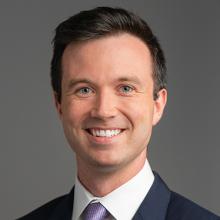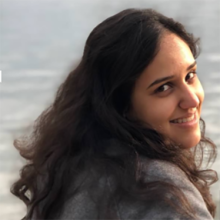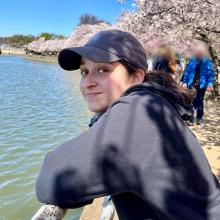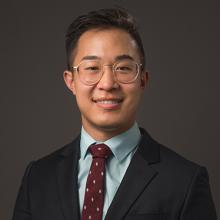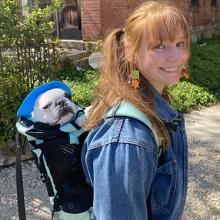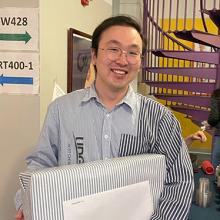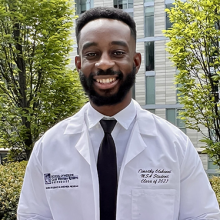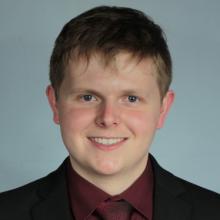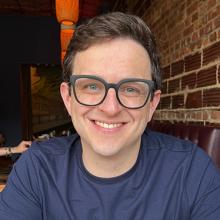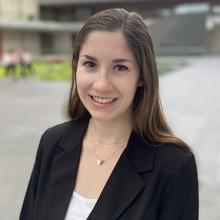Case Western Reserve University School of Medicine will celebrate graduating students May 17–21, during commencement week. Extensive training, critical hands-on experience and invaluable mentorship have prepared these students to become leaders and innovators in their chosen healthcare professions where they will improve the health of the communities they serve.
Here are just a few stories from the medical school’s graduating students.
Kevin Allan - Medical Scientist Training Program
Why did you choose to focus on ophthalmology?
Ophthalmology offers a perfect blend of clinic and surgery that together have a dramatic impact on the quality of life for patients, which makes for a dynamic and rewarding career. Additionally, ophthalmology exists at the forefront of scientific therapeutics, such as gene therapy and stem cell interventions. As a developing physician-scientist, it is my hope to join and make headway in these areas of scientific discovery to improve current treatments for ocular disease.
What are your plans after graduation?
Having returned from a trip to Italy immediately prior to graduation, I will be slowly gearing up to start residency at Cleveland Clinic in June. My current 10-year plan (which changes quite frequently) is working at an academic center performing cutting-edge research, teaching medical students and residents and working with multi-disciplinary teams to provide top-notch clinical care for patients.
Why did you choose Case Western Reserve University School of Medicine?
I was drawn to the friendly and collaborative community, that when combined with the impressive research environment made CWRU my top choice program.
What is your favorite memory from CWRU?
Having been at CWRU for 9 years, it is incredibly challenging to select a single favorite memory! But one of my favorite traditions was the annual MSTP retreat. It was always a blast getting to meet students at all stages of the program and, of course, karaoke with the MSTP leadership was always a big highlight!
What advice do you have for students starting the same program?
My advice to students joining the MSTP or medical programs is to try to be patient with yourself and enjoy the journey. It is a long and challenging program and it can be easy to lose sight of your goals, but you can do it! Try to find incredible mentors who keep you energized and see where your passions carry you. And, of course, never hesitate to reach out to CWRU alumni for advice!
Avantika Bhaduri - Master of Public Health
Why did you choose the Master of Public Health program?
I was studying medical anthropology as an undergraduate which helped me learn and practice qualitative skills. I wanted to couple that knowledge with a different perspective and approach to human health. Therefore, I applied to the interdisciplinary Master of Public Health (MPH) program to use my anthropological lens to develop quantitative skills and apply them to improve population health.
What are your plans after graduation?
I will be moving to the Washington D.C. area to pursue a program in biodefense.
Why did you choose Case Western Reserve University School of Medicine?
I was an undergraduate student at CWRU and the Integrated Graduate Studies program offered me a way to seamlessly combine my undergraduate and graduate degrees while also saving both time and tuition. Additionally, the array of concentrations offered in the MPH program allowed me to focus and dive deep into my public health interests like epidemiology and adolescent health.
What is your favorite memory from CWRU?
My favorite memory has to be the Public Health Innovations conferences each semester. I am always fascinated by listening to what my peers and their mentors have accomplished beyond the classroom. The impact their research has made gives me so much hope and it motivates me to continue pursuing my public health passions in the future.
What advice do you have for students starting the same program?
One of the biggest strengths of the MPH program is the wonderful people: the faculty, the alumni, the administration and peers. Beyond your classes, in a professional program, I would encourage new students pursuing an MPH to be proactive and to take the time to build relationships with people. They are your biggest allies and support system, and will always be ready to bounce ideas off of while trying to navigate a research question or figuring out post-graduation steps.
Monica Chavan - Doctor of Medicine
What are your plans after graduation?
Diagnostic and Interventional Radiology Residency at the University of Michigan
What is your favorite memory from CWRU?
Being the first group to start classes in the Health Education Campus and getting to see the space utilized for so many different purposes has been very meaningful. Aside from numerous curricular activities, a lot has happened in the building during our four years here: a transformation into Hope Hospital early in the COVID-19 pandemic, a makeover for the 2020 Presidential Debate, hosting SNMA's Region V Medical Education Conference in 2022, and celebrating with friends & family during Match Day 2023 festivities. I'm in awe of everything my colleagues have achieved and will remember all the fun times we had in the HEC during medical school. One of my favorite memories was the experience of filming a video skit called "Party in the HEC" with John Pearl and many other talented classmates for Doc Opera 2019.
What advice do you have for students starting the same program?
Ask for help when you need it, and volunteer your help when you can give it.
Lloyd Chen - Doctor of Medicine
Why did you choose to become a medical doctor?
As a healthcare provider, we have the opportunity to build such privileged relationships with our patients and help people while they are at their most vulnerable. This level of personal and clinical impact on a day-to-day basis is something that exists in few other professions. There are also so many opportunities for operational improvement to the larger healthcare system from a quality perspective - across assuring equitable access to treatment, consistent implementation of policy, and constant development of best practices—all of which I hope to incorporate into my future career.
Why did you choose Case Western Reserve University School of Medicine?
CWRU School of Medicine stood out to me for the especially collaborative and open culture that it fosters, which I knew would allow me to thrive in balancing study and extracurricular interests.
What are your plans after graduation?
Anesthesiology residency at Beth Israel Deaconess Hospital in Boston, MA
What is your favorite memory from CWRU?
My favorite memories are the annual Friendsgiving that my friends host where we all gather, eat and be merry without worrying about anything else.
What advice do you have for students starting the same program?
Study hard, play hard, and invest in your friends—they might be the best friends you ever find!
Halle Kotchman - Doctor of Medicine
Why did you choose to become a medical doctor?
I fell in love with emergency medicine during my two-week rotation. After years of thinking orthopedics my two weeks in the emergency department just felt so right. I changed my AIs and electives in April of M3— I would recommend making up your mind earlier if possible. I couldn't be happier with my decision for residency!
What are your plans after graduation?
Emergency Medicine residency at The MetroHealth System and taking a nice long nap on a warm beach.
Why did you choose Case Western Reserve University School of Medicine?
It's close to home and had access to four different hospital systems. I was able to rotate at MetroHealth which is where I fell in love with emergency medicine and The MetroHealth System!
What is your favorite memory from CWRU?
Starting Medicine in Motion and doing our first event as a 5k in the metro parks with all of my friends!
What advice do you have for students starting the same program?
Don't take life so seriously—you'll figure it all out along the way.
Zhenghao Liu - Master of Science, Biochemistry
Why did you choose the biochemistry master of science program?
I want to be a surgeon-scientist.
What are your plans after graduation?
I will study toward my PhD.
Why did you choose Case Western Reserve University School of Medicine?
The reason is complicated, but I want to say it's because of fate.
What is your favorite memory from CWRU?
Chatting with friends in our laboratory.
What advice do you have for students starting the same program?
These things are difficult, but you can do it.
Timothy Olukanni - Master of Science, Anesthesia
Why did you choose the Master of Science in Anesthesia program?
For me, a passion for healthcare and the opportunity to have a direct impact on patient outcomes was a major driving force. I was drawn to the intellectual challenge of the field and the need to have a deep understanding of human physiology and pharmacology.
What are your plans after graduation?
Working at the George Washington University Hospital in Washington, D.C.
Why did you choose Case Western Reserve University School of Medicine?
The reputation of the program, the quality of the faculty and resources, the location and campus environment, and the ability to obtain hands-on experience quickly.
What is your favorite memory from CWRU?
Traveling to New Orleans with my classmates to attend the ASA conference. I got the opportunity to experience a new city with some of my friends and professors while also networking with great minds in the field of anesthesia.
What advice do you have for students starting the same program?
Direct your attention toward the present moment, and strive to achieve what you can in each passing day. Rather than overwhelming yourself with future uncertainties, cultivate a sense of mindfulness and commit to making each day count towards your goals and aspirations.
Nathan Ruhde - Master of Public Health
Why did you choose the Master of Public Health program?
I chose public health because I cared about helping people and making a difference, but felt my strengths served better at looking at things from a population level.
What are your plans after graduation?
I am exploring paths to apply my passion and skills for statistics and economics to helping others more deeply understand complex public health issues.
Why did you choose Case Western Reserve University School of Medicine?
I chose Case Western Reserve because of the relationships that I had built. After coming to CWRU for undergrad, I already knew some of the professors in the School of Medicine and knew how much they genuinely cared about helping students learn. That meant the world to me.
What is your favorite memory from CWRU?
My favorite memory was doing Innovations in person this year. Everyone worked so hard and it was nice to be able to celebrate in person with everyone for the first time in a long while.
What advice do you have for students starting the same program?
Don't be afraid to ask questions! Odds are that someone else has the same question you do. If you don't ask, you won't know.
David Sweet - Medical Scientist Training Program
Why did you choose the Medical Scientist Training Program?
The physician-scientist training pathway, although long and somewhat arduous, provides expertise in biomedical research and clinical medicine that facilitates groundbreaking translational research directly impacting patients that we work with every day. To me, physician-scientists are the epitome of 'lifelong learners' and emulate the ideals of the academic mission. The MSTP provided rigorous training in both clinical medicine and basic science research to best prepare me for my future career ambitions.
What are your plans after graduation?
I will be an Internal Medicine resident at the University of Pittsburgh Medical Center (UPMC)!
Why did you choose Case Western Reserve University School of Medicine?
From the clinical training side, CWRU's commitment to innovation in medical education was a huge draw for me. The self-driven learning facilitated by the WR2 curriculum really meshed with my own learning style and allows students to pursue their interests and a depth of the material to which they find important. As a scientist, the research infrastructure provided by CWRU and University Hospitals included a platform for learning multidisciplinary science while collaborating with world leaders in their fields. I knew these opportunities would allow me to grow in my ability to think on the cutting-edge, while also surrounding me with a scientific family who supports trainees throughout their learning.
What is your favorite memory from CWRU?
I've been here for more years than I care to count and, as such, have MANY wonderful memories. To narrow it down to one would be too tough, but I think I am proudest of the change and progress I've had the privilege to witness in our community; I've seen colleagues in the program develop into immense clinical and scientific leaders, have lived through changes in medical campuses, and saw how the academic and scientific communities banded together during the pandemic. All of these things make CWRU an incredibly special place to train and meet lifelong friends.
What advice do you have for students starting the same program?
I would emphasize the importance in finding mentors at every level and for every aspect of your life and career that are important to you. This means (of course) identifying scientific mentors that support you and facilitate your growth, but also identifying clinical mentors that instill an excitement in your specialty of interest, life mentors to help navigate the inevitably tough moments of the training process and a close-knit group of near-peer mentors that have gone through/are going through similar things as you with whom to commiserate.
Mallory Walsh - Master of Public Health
Why did you choose the Master of Public Health program?
I chose to pursue a masters degree in public health because I am committed to advancing the health of my community. I knew this degree program would prepare me to lead disease prevention efforts and address health disparities, particularly among vulnerable populations.
What are your plans after graduation?
I will be working at the Prevention Research Center for Healthy Neighborhoods in Adolescent Health Surveillance on the Youth Risk Behavior Survey Project.
Why did you choose Case Western Reserve University School of Medicine?
I knew the MPH program at CWRU would provide me with insurmountable opportunities to work with the Cleveland community and apply my public health knowledge in many real-world settings. It was important to me to attend a school that I believed reflects my passion for public health and commitment to make a difference in the community.
What is your favorite memory from CWRU?
My favorite memory was serving as an MPH Student Representative. I enjoyed spending time with MPH students at our fall event in 2022!
What advice do you have for students starting the same program?
Make the most of every moment and experience. Your time in the program goes by fast, so try to soak it all in! Embrace the challenges that lie ahead. Every challenge or setback contributes to your personal and professional growth.


